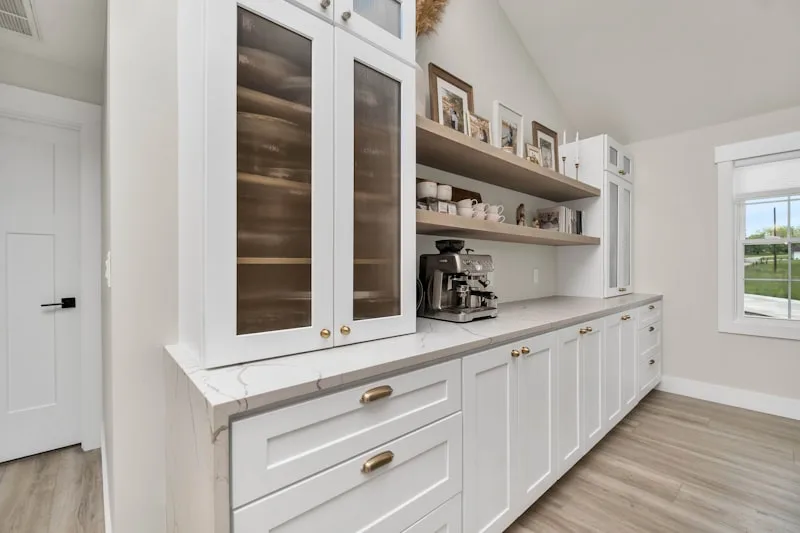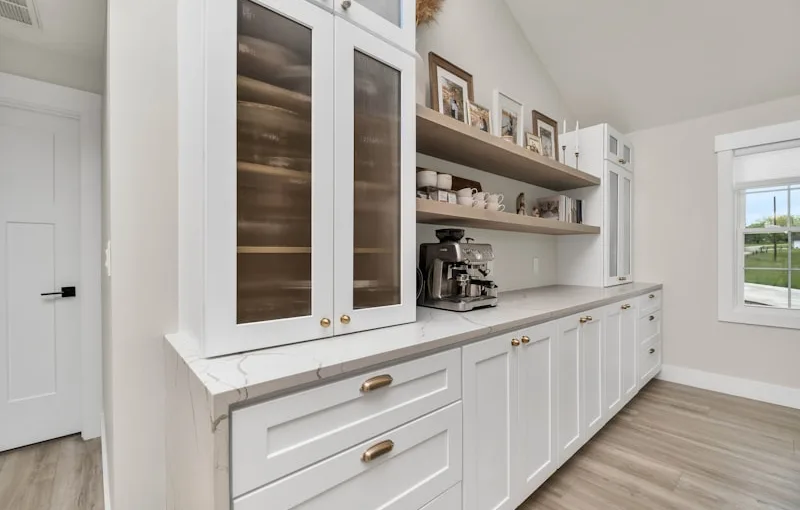Now, let’s talk about how to tackle that stench. First off, empty those cabinets like you’re preparing for a garage sale. Get everything out and take a good look. You might find some expired spices or that half-eaten bag of chips that’s been hiding in the back. Next, grab a mixture of warm water and a splash of vinegar—nature’s odor neutralizer. Wipe down the shelves with a cloth soaked in this solution. It’s like giving your cabinets a refreshing spa day!
If the smell persists, consider using baking soda. Sprinkle some on the shelves and let it sit overnight. It’s like a little magic trick that absorbs odors while you sleep. And don’t forget to check the corners and crevices; that’s where the sneaky smells often hide.

Lastly, to keep your cabinets smelling fresh, think about adding a small bowl of activated charcoal or coffee grounds inside. They’re like tiny odor-fighting ninjas, ready to tackle any unwelcome scents. So, next time you open those cabinets, you’ll be greeted with a breath of fresh air instead of a nose-wrinkling surprise!
Unmasking the Mystery: Why Your Kitchen Cabinets Smell and How to Banish the Odor
First off, let’s talk about the usual suspects. Food spills, crumbs, and even expired items can create a breeding ground for bacteria and mold. Imagine a tiny science experiment happening right in your cabinet! If you’ve got old spices or that half-eaten bag of chips lurking in the back, it’s time to do some detective work. Clear everything out, and you might be shocked at what you find.
Next, consider the materials of your cabinets. Wood, while beautiful, can absorb moisture and odors over time. Think of it like a sponge soaking up all the smells from your kitchen. If your cabinets are made of wood, they might need a little TLC. A simple wipe-down with a mixture of vinegar and water can work wonders, cutting through the grime and leaving a fresh scent behind.
And let’s not forget about the air circulation! If your cabinets are tightly packed, they might not be getting enough airflow. It’s like trying to breathe in a crowded elevator—nobody likes it! Try rearranging your items to allow for better ventilation. You could even toss in some baking soda or activated charcoal to absorb those pesky odors.
So, the next time you catch a whiff of something less than pleasant, remember: it’s all about cleaning, maintaining, and letting your cabinets breathe. With a little effort, you can turn that mystery smell into a fresh, inviting kitchen space!
From Funky to Fresh: The Ultimate Guide to Cleaning Stinky Kitchen Cabinets
First things first, let’s tackle the source of the smell. Often, it’s the crumbs and spills that have taken up residence in the nooks and crannies. Start by emptying out your cabinets. It’s like a mini spring cleaning! As you pull everything out, take a moment to inspect your items. Toss anything expired or that you haven’t used in ages. You’ll be amazed at how much fresher your space feels with less clutter.
Now, onto the cleaning magic. Grab a mixture of warm water and a splash of vinegar—nature’s powerhouse cleaner. This combo not only cuts through grease but also neutralizes odors. Use a soft cloth or sponge to wipe down the insides of your cabinets. Think of it as giving your cabinets a refreshing spa day! For stubborn stains, sprinkle a little baking soda on the area, let it sit for a few minutes, and then scrub gently. It’s like a mini workout for your cabinets!
The Hidden Culprits: Discover What’s Causing Your Kitchen Cabinets to Smell
First off, let’s talk about food spills. We’ve all had that moment when a jar of sauce tips over or a bag of flour bursts open. Even the tiniest spill can lead to a lingering smell if not cleaned up properly. Think of it like a tiny time bomb of odor just waiting to explode every time you open the cabinet.
Next up, let’s not forget about moisture. If your kitchen isn’t well-ventilated, humidity can build up, creating a perfect breeding ground for mold and mildew. Imagine your cabinets as a cozy little home for these unwanted guests. They thrive in damp environments, and before you know it, your kitchen smells like a damp basement!
And what about those forgotten items? You know, the half-used bags of chips or that box of expired pasta hiding in the back? They can turn into little odor factories, releasing their stench into the air every time you reach for a spice jar. It’s like a game of hide-and-seek, but the stakes are your sense of smell!
Lastly, let’s consider the materials of your cabinets. Wood can absorb odors over time, especially if it’s not sealed properly. It’s like a sponge soaking up all the smells from your kitchen, and trust me, that’s not the kind of sponge you want in your life!
So, the next time you catch a whiff of something funky, remember these hidden culprits. Your kitchen cabinets might just need a little TLC to get back to smelling fresh and inviting!
Stinky Cabinets No More: Proven Techniques for a Fresh Kitchen Environment
First off, let’s talk about the power of baking soda. This little miracle worker is like the superhero of odor elimination. Just sprinkle some in the corners of your cabinets and let it sit for a few hours—or even overnight. It’ll absorb those nasty smells like a sponge soaking up spilled milk. When you’re ready, just vacuum it up or wipe it away, and voilà! Freshness restored.
Next up, consider using essential oils. Not only do they smell divine, but they also have antibacterial properties. A few drops of lemon or lavender oil on a cotton ball tucked away in your cabinet can work wonders. It’s like having a mini aromatherapy session every time you reach for your favorite spices.
And let’s not forget about the importance of regular cleaning. Think of your cabinets as the unsung heroes of your kitchen. They deserve a little TLC! Wipe them down with a mixture of vinegar and water to cut through grease and grime. This not only freshens up the space but also keeps those odors at bay.
Lastly, keep an eye on what you store. Old, expired items can be the culprits behind those unpleasant smells. Regularly check your pantry and toss anything that’s past its prime. It’s like decluttering your mind—once you clear out the old, you make room for the new and fresh.
Odor Alert: Top Reasons Your Kitchen Cabinets Are Emitting Unpleasant Smells
First off, let’s talk about food spills. We’ve all had that moment when a jar of sauce tips over, and before you know it, there’s a sticky mess lurking in the corner. Even the tiniest spill can attract mold and bacteria, leading to a funky smell that can linger for weeks. It’s like a hidden monster under your bed, just waiting to be discovered!
Next up, consider the age of your cabinets. If they’re older than your favorite pair of jeans, they might be absorbing odors from the surrounding environment. Wood, especially, can soak up smells like a sponge. Think of it as your cabinets having a bad hair day—sometimes, they just need a little TLC to freshen up!
Another culprit could be the cleaning products you’re using. Some strong chemicals can leave behind a lingering scent that’s less than pleasant. It’s like trying to mask a bad smell with a stronger one; it just doesn’t work! Opt for natural cleaners that won’t leave your cabinets smelling like a science experiment gone wrong.
Cleaning Secrets: How to Eliminate Bad Odors from Your Kitchen Cabinets

First off, let’s talk about the power of baking soda. This magical white powder isn’t just for baking; it’s a superstar when it comes to odor elimination. Simply sprinkle some in a bowl and leave it in your cabinet overnight. It’s like a sponge for smells, soaking up all the funky odors while you sleep.
Next, consider the wonders of vinegar. This kitchen staple is not just for salad dressings! Mix equal parts water and vinegar in a spray bottle, and give your cabinets a good spritz. The acidity in vinegar neutralizes odors, leaving behind a fresh scent. Plus, it’s a natural cleaner, so you’re killing two birds with one stone.
Now, if you want to go the extra mile, think about adding some essential oils. A few drops of lemon or lavender oil on a cotton ball tucked into the corner of your cabinet can work wonders. It’s like a mini aromatherapy session every time you open the door!
And let’s not forget about regular maintenance. Every few months, take a peek inside your cabinets. Toss out expired items and give the shelves a good wipe down. It’s like spring cleaning, but for your kitchen’s hidden nooks.
So, next time you catch a whiff of something less than pleasant, remember these cleaning secrets. Your kitchen cabinets will thank you, and so will your nose!
Frequently Asked Questions
What Causes Kitchen Cabinets to Smell Bad?
Bad odors in kitchen cabinets can arise from various sources, including food spills, mold growth, and moisture accumulation. Improper ventilation and the presence of old or expired food items can also contribute to unpleasant smells. Regular cleaning and ensuring proper airflow can help prevent these odors.
Are There Natural Remedies to Eliminate Cabinet Smells?
Natural remedies for eliminating cabinet smells include using baking soda, which absorbs odors, and placing activated charcoal or coffee grounds inside the cabinet. Vinegar can also be used to wipe down surfaces, as it neutralizes odors. Additionally, essential oils like lemon or lavender can provide a fresh scent when added to cotton balls and placed in the cabinet.
How Can I Prevent Bad Odors in My Kitchen Cabinets?
To prevent bad odors in kitchen cabinets, ensure proper ventilation by keeping doors slightly ajar when not in use. Regularly clean the interiors with a mixture of vinegar and water to eliminate any lingering smells. Store food items in airtight containers to prevent moisture and odor absorption. Additionally, placing baking soda or activated charcoal in the cabinets can help absorb unwanted odors.
What Are the Best Cleaning Methods for Stinky Kitchen Cabinets?
To eliminate odors from kitchen cabinets, start by emptying them and cleaning surfaces with a mixture of warm water and mild detergent. For persistent smells, use a solution of vinegar and water or baking soda paste, applying it to affected areas. Ensure proper ventilation while cleaning, and consider placing odor absorbers like activated charcoal or coffee grounds inside the cabinets. Regular maintenance and immediate cleanup of spills can prevent future odors.
How Can I Identify the Source of the Odor in My Cabinets?
To identify the source of an odor in your cabinets, start by removing all items and inspecting for any spills, mold, or expired products. Check for signs of pests or moisture, as these can contribute to unpleasant smells. Clean the surfaces with a mixture of vinegar and water to neutralize odors. If the smell persists, consider placing an open box of baking soda inside the cabinet to absorb odors over time.
